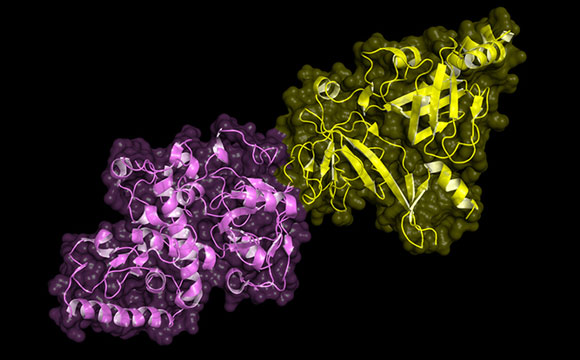
A newly published study from Yale University reveals how biochemists might be able to decrease drug resistance to existing therapies that target ovarian and breast cancer.
Yale University researchers have discovered why a key molecular assistant is crucial to the function of the BRCA2 gene, which in some mutant forms can lead to ovarian and breast cancer in as many as 6 in 10 women.
The findings suggest how biochemists might be able to decrease drug resistance to existing therapies that target this form of cancer, the authors report in the July 2 issue of the journal Molecular Cell.
“We can design specific targets for drug development only if we fully understand the key players and how they work in the pathway for repairing DNA breaks,” said Patrick Sung, professor in the Department of Molecular Biophysics and Biochemistry, researcher at the Yale Cancer Center, and senior author of the paper.
BRCA genes normally act to repair damaged DNA and suppress tumor formation. Variants of BRCA genes, however, are hijacked by cancer and have been recognized for decades as markers for increased risk of breast cancer, but they also play a role in ovarian, prostate, and pancreatic cancer.
Drugs that target DNA repair pathways in patients with BRCA mutations have proved effective in attacking cancer, but these patients tend to develop resistance to the drug. The cancer returns because the BRCA proteins develop secondary mutations, which continue to promote cancer growth.
The new paper establishes the crucial role played by co-factor DSS1, which mimics DNA that aids in the repair damage of cells. Without DSS1, BRCA2 variant cannot fulfill its normal duty of DNA repair crucial to the survival of cancer. Drugs that interfere with DSS1 function could be developed and used in conjunction with existing drugs like Astra Zeneca’s Lynparza to overcome this resistance, Sung said.
The work was done in collaboration with Walter Chazin at Vanderbilt University, Claudia Wiese at Colorado State University, and Yale colleague Ryan Jensen and was funded by research grants from the National Institutes of Health
Other Yale authors include Weixing Zhao, Joseph San Filippo, Youngho Kwon, Judit Jimenez-Sainz, and Lucy Lu.
Reference: “Promotion of BRCA2-Dependent Homologous Recombination by DSS1 via RPA Targeting and DNA Mimicry” by Weixing Zhao, Sivaraja Vaithiyalingam, Joseph San Filippo, David G. Maranon, Judit Jimenez-Sainz, Gerald V. Fontenay, Youngho Kwon, Stanley G. Leung, Lucy Lu, Ryan B. Jensen, Walter J. Chazin, Claudia Wiese and Patrick Sung, Molecular Cell.
DOI: 10.1016/j.molcel.2015.05.032